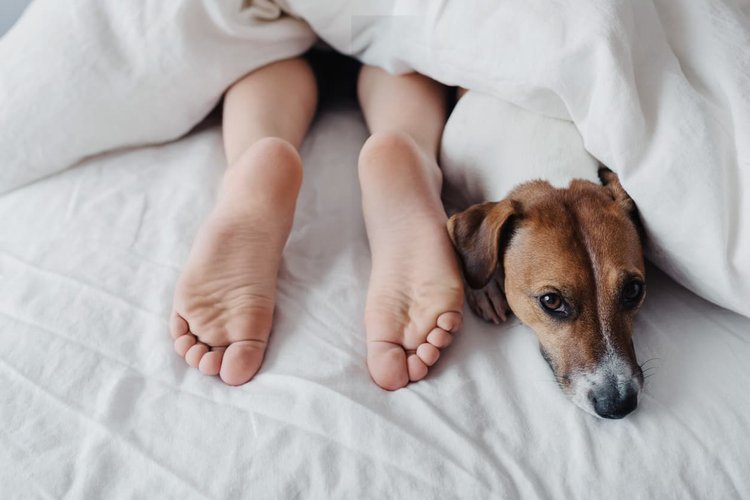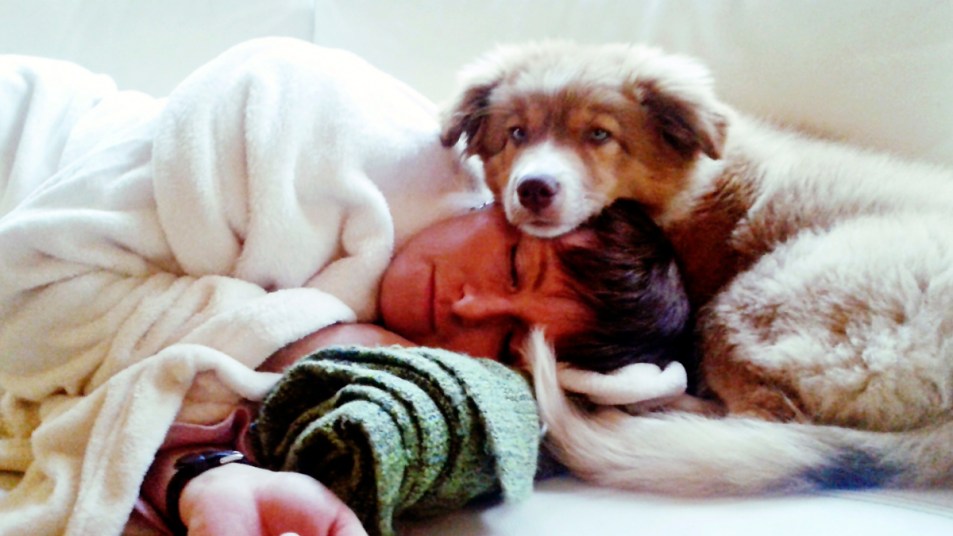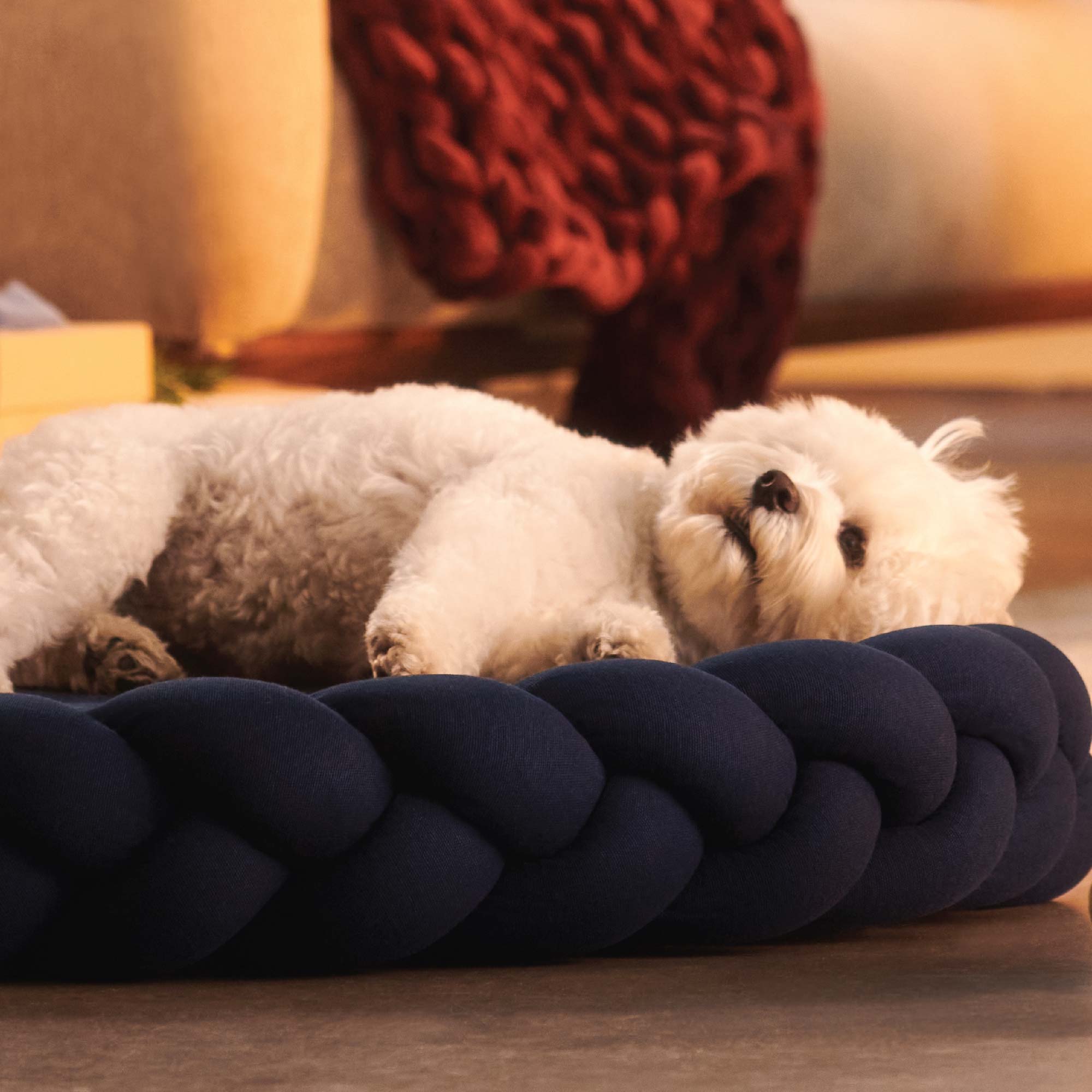Physical Address
304 North Cardinal St.
Dorchester Center, MA 02124
Physical Address
304 North Cardinal St.
Dorchester Center, MA 02124

Your dog sleeps on your head likely as a sign of affection or for security. It may also seek warmth or be a habit developed from puppyhood.
Dogs often choose to sleep close to their owners for comfort and bonding. When your furry friend decides your head is the perfect pillow, it’s typically a blend of trust and closeness. Understanding this behavior is crucial for dog owners who might be concerned if the habit is peculiar or disruptive.
This cozy preference can emanate from the nesting instincts of dogs, their pack mentality, or simply because they love being near you. Addressing this behavior involves recognizing the underlying reasons, considering the health implications for both the pet and the owner, and determining the best steps to ensure a good night’s sleep for everyone involved. Creating a comfortable sleeping space and establishing boundaries early on can help guide your dog’s sleeping patterns without sacrificing the affectionate bond you share.

Credit: www.scenthound.com
If you share your bed with a furry friend, you might be familiar with a peculiar habit – your dog sleeps on your head. Dogs, often considered members of the family, have their quirky behaviors, but this one leaves many owners scratching their heads. Why does Fido prefer your pillow? The answers might surprise you and shed light on your dog’s personality and instincts.
Is It Affection or Dominance?
Interpreting your dog’s actions can sometimes feel like deciphering a complex code. When Fido curls up on your head, it’s a behavior that sparks debate. Some argue it’s a sign of affection, a way for your dog to stay close and show love. Others suggest it might reflect a sense of dominance, with your dog asserting itself as the pack leader in the family hierarchy.
To understand why your dog sets up camp on your head, we must look into their ancestral habits. Dogs are descendants of wolves, creatures that lived and slept in packs. Sleeping close allowed them to stay warm and protect each other. Today’s domestic dogs still carry these instincts. Factors influencing your dog’s choice include:
Delving into these behaviors, it’s essential to observe your dog’s body language and the environment. Many dogs display a mixture of affection and comfort-seeking behaviors. It’s rarely about dominance. Speak to a vet or a behaviorist if you’re concerned or if the habit becomes troublesome.

Ever wondered why your furry friend snuggles up so close they end up on your head? It’s not just about seeking a comfy pillow. Dogs often display behaviors akin to their wild ancestors. Their sleeping habits can tell a story of seeking comfort, but also of trying to claim their beloved pack leader—you!
At night, temperatures drop. Your head, releasing warmth, becomes the perfect heater. Your steady breath, a comforting rhythm, offers a sense of security for your pooch. They cherish this warmth, feeling safe as they nestle into your neck.
Yet, there’s more to it. By laying on your head, your dog may be marking their territory. This spot, close to you, signifies their special bond and status within the family pack. Your scent intermingles with theirs, announcing to any other pets that this human is taken!
The Psychology Behind Canine Cuddles can be quite fascinating. Our furry friends often show affection in the most adorable ways. Yet, when your dog chooses to sleep on your head, it might leave you puzzled. Wondering why?
Let’s explore the behavior from a psychological viewpoint and what it means for your bond with your four-legged companion.
Dogs are pack animals by nature. They look for warmth, security, and companionship. Your dog sees you as a pack leader or a member of their pack.
By cuddling up on your head, your pooch may feel more connected to their human “pack.”
Just like humans, dogs have their own love languages. Cuddling is one common way dogs express their affection.
| Doggy Love Language | Examples |
|---|---|
| Physical Affection | Licking, nuzzling, sleeping close |
| Quality Time | Long walks, playing fetch |
| Acts of Service | Guarding, following commands |
Your head might offer a desirable combination of warmth and scent that comforts your dog. It’s their way of saying, “I love you.”

Credit: www.womansworld.com
There are few things more adorable than a furry friend cuddling up to you. But when your dog insists on sleeping on your head, it might raise some eyebrows. Let’s explore why this might be a problem and how to address it while still enjoying snuggle time with your pup.
Your dog’s preference for using your head as a pillow might be cute, but it could also pose health risks. Close proximity to your face can transfer allergens or even lead to disrupted sleep. It’s crucial to consider these points:
Checking in with a healthcare provider can shed light on any health issues. They can recommend ways to mitigate allergies or improve sleep quality.
Creating a comfortable sleeping arrangement benefits both you and your dog. Here’s a simple strategy to start the process:
A gradual shift to these new boundaries can result in a happy compromise. You both end up with the rest you need.
If your dog cuddles up on your head at night, it’s time for a change.
We’ll explore how creating a cozy spot and using positive routines can promote independent sleep habits for your furry friend.
Independent sleep keeps both you and your dog comfortable and rested.
Let’s dive into some effective training tips.
Dogs need their own space to feel safe and secure.
Start with a bed that suits your dog’s size and sleeping style.
Consistency is key in training your dog to sleep independently.
Establish a bedtime routine that includes going to the toilet, a calming activity, and then bed.
| Time | Activity |
|---|---|
| 9:00 PM | Last potty break |
| 9:15 PM | Quiet play or cuddle |
| 9:30 PM | Go to bed command |
Reward your dog for following the routine.
Use treats, praise, and affection as rewards.
Over time, your dog will associate these positive experiences with their bed.
We share a special bond with our furry friends. Their behaviors, like deciding to sleep on our heads, can leave us puzzled. To understand why they do this, let’s dive into their unique personalities.
Different dog breeds exhibit various traits. These traits can affect sleeping patterns. Here’s a look at how a pup’s breed might influence its choice of sleeping spots:
Recognizing these breed-specific behaviors helps us understand our dog’s sleeping habits.
The bond shared with a dog is unique. It influences their behavior. Dogs often mirror our emotions and actions. When a dog chooses to sleep on your head, it might mean several things:
| Reason | What It Indicates |
|---|---|
| Affection | Your dog feels close to you and shows love. |
| Comfort | Your scent and the warmth from your head comforts them. |
| Security | Being close to you makes them feel safe. |
Understanding this bond shines a light on why your dog might want to be your ‘headwear’! To cultivate this bond, spend quality time and understand your dog’s need for closeness.

Credit: bearaby.com
Dogs often seek comfort, warmth, and security when choosing their sleeping positions. Sleeping on your head can also be a sign of affection and the desire to be close to their owner. It’s a behavior showing trust and companionship.
Yes, it’s quite normal for dogs to sleep on their owners. This behavior stems from their instinct to stay close and bonded with their pack. It can also be a way for your dog to protect you or feel secure.
When a dog sleeps on your head, it often signifies trust and affection. They may also be seeking a height advantage, which is an instinctual behavior related to safety and surveillance from a higher viewpoint.
To change this behavior, encourage your dog to sleep in their own bed by making it comfortable and rewarding them for using it. Consistency and positive reinforcement are key. Training commands like ‘off’ can also be helpful.
Wrapping up, the quirk of dogs sleeping on human heads is charming yet puzzling. While it’s a sign of trust and affection, comfort for both is key. If your furry friend makes a habit of this, consider it a unique bonding ritual.
Just remember to ensure everyone gets a good night’s sleep.